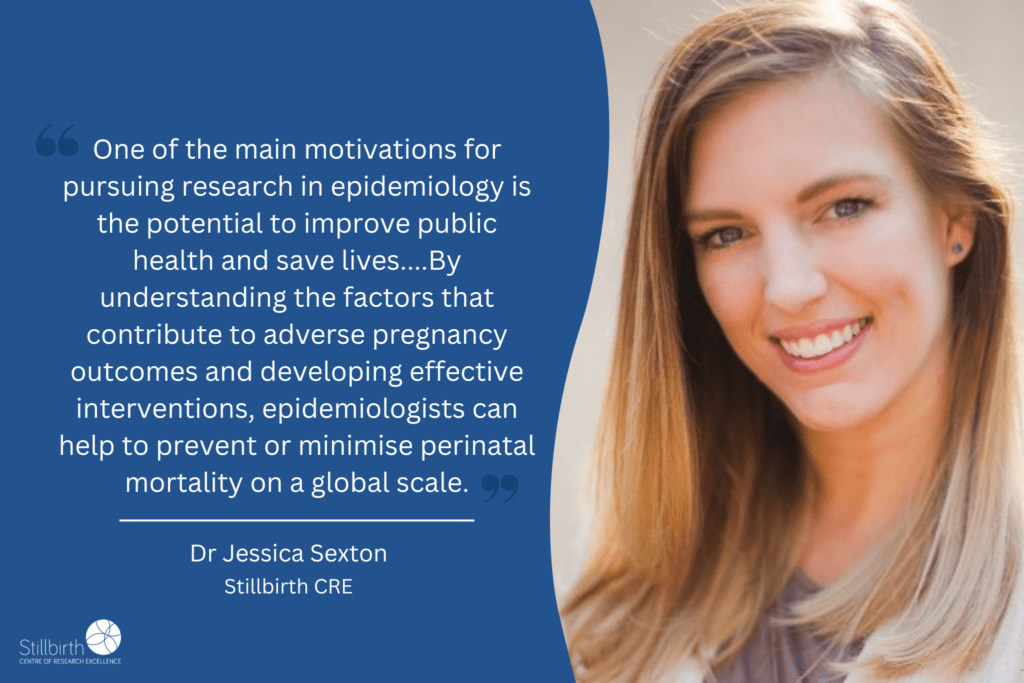Get to know our researchers here at the Stillbirth CRE! This week, we had the pleasure of spending a few minutes with Dr Jessica Sexton, where she shared insights into her current projects and why she is passionate about her work here.

I have been with the CRE since 2018, previously as a PhD student and currently as a clinical epidemiologist.
The Data to Drive Change Program is my current area of work where I am very excited to support and lead data-centric projects.
One of the most rewarding aspects of being a clinical epidemiologist is the potential to make a direct impact on patient care. By conducting research on risk estimation, clinical epidemiologists can provide evidence-based recommendations to clinicians and improve patient outcomes.
In addition, I often work in interdisciplinary teams with clinicians, public health professionals, and other researchers, which can provide opportunities for collaboration and knowledge exchange. This can be especially rewarding when working on complex health issues that require a multidisciplinary approach.
This would most certainly be the stillbirth risk prediction model as part of the ongoing work related to the Safer Baby Bundle. It was exciting to develop a novel way to incorporate remoteness as a potential proxy indicator for environmental risk in a statistical model.
Using data to address clinical and public health issues has always been a key interest of mine. My background as an epidemiologist began in the classroom where I trained as a biomedical laboratory scientist. This undergraduate program provided a strong science foundation that enabled me to focus on building statistical and quantitative skills in a post-graduation epidemiology program. During a research project as a student in a postgraduate program, an opportunity to study neonatal sepsis ultimately lead to my interest in focusing on maternal and child health.
Epidemiology is the study of how diseases spread and how they can be controlled or prevented. One of the main motivations for pursuing research in epidemiology is the potential to improve public health and save lives. Epidemiologists are also motivated by the challenge of understanding complex systems and interactions between different factors that contribute to poor health outcomes. This requires a multidisciplinary approach that incorporates knowledge from fields such as midwifery, medicine, statistics, and psychology.
In addition to the potential for improving public health, I am motivated by the potential for perinatal research to have a global impact. By understanding the factors that contribute to adverse pregnancy outcomes and developing effective interventions, epidemiologists can help to prevent or minimize perinatal mortality on a global scale.
Develop a strong foundation in statistics and data analysis. Epidemiology relies heavily on the use of statistical methods to analyse and interpret data, so it is essential to have a strong understanding of statistical concepts and methods.
Familiarise yourself with the literature. Read widely in your field to develop a deep understanding of the key concepts, methods, and findings that have shaped epidemiology. This will help you to develop a critical perspective and identify areas where you can make a unique contribution.
Collaborate with others. Epidemiology is a highly collaborative field, and working with others can help you to gain new insights and perspectives, as well as develop important skills such as project management, teamwork, and communication.
Pursue opportunities to gain practical experience. Seek out opportunities to gain hands-on experience with data collection, analysis, and interpretation. This may include internships, research assistantships, or volunteer work with public health organizations.
Finally, be persistent and resilient. Research can be challenging, and setbacks and failures are a normal part of the process. Keep pushing forward, learn from your mistakes, and don't be afraid to ask for help or guidance when you need it.
The next set of goals involves funding applications to begin establishing independence as a researcher. Wish me luck!
Making pottery and coffee with my dogs at Our Space Brisbane!